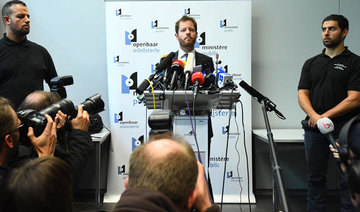BRUSSELS: Spanish Prime Minister Mariano Rajoy and his Belgian counterpart Charles Michel are due to address lawmakers over the Catalan crisis on Wednesday after the deposed separatist leader, Carles Puigdemont, urged the European Union to stop supporting a “coup” against his region.
On Tuesday Puigdemont slammed the European Union for backing Rajoy’s bid to quash Catalan secession, after calling on pro-independence parties to unite for next month’s regional election.
“Will you accept the result of the Catalan referendum or will you continue to help Mr.Rajoy in his coup d’etat?” Carles Puigdemont, who was dismissed by Madrid last month after the Catalan parliament declared unilateral independence, said in Brussels.
Puigdemont, who faces extradition on charges of rebellion and sedition, was speaking at an event attended by some 200 pro-independence Catalan mayors who had flown there for support.
Rajoy and Michel are both due to speak to their respective parliaments Wednesday on the worst crisis that Spain has known in forty years of democracy. Catalan Separatist associations and a trade union have called for a general strike in Catalonia, ahead of a major demonstration on Saturday.
The secession crisis kicked off when Catalan leaders held an independence referendum on October 1 despite a court ban.
Regional authorities said 90 percent opted to break away from Spain, though less than half of eligible voters turned out in a region deeply divided over independence.
The unregulated referendum was also repressed by police trying to stop people from voting.
Then on October 27, Madrid took direct control of the once semi-autonomous region after the Catalan parliament declared independence, dismissed regional leaders and called elections for December 21.
Earlier on Tuesday, Puigdemont called for pro-independence parties to unite for the vote.
“We have no option but to go all in together,” he told Catalan radio.
The crisis has deeply divided Catalans and seen more than 2,000 businesses move their headquarters out of the wealthy region, home to 7.5 million people.
Puigdemont has said he is prepared to run as a candidate on December 21, but it is far from clear whether or not he will even be in the country by then.
In 2015, the “Together For Yes” coalition — composed of left-wing party ERC and Puigdemont’s conservative PDeCAT — delivered a majority with 72 seats out of the 135-seat parliament, aided by their smaller ally, the far-left CUP party.
But Tuesday night ERC dismissed this option for the coming poll, with spokesman Sergi Sabria saying in a statement that “faced with the impossibility of forming a truly unified list, we will seek to coordinate on the basis of different candidacies.”
Although parties still have until later this month to officially register on electoral lists, politicians in Madrid will watch closely for any possible cracks in the pro-independence front.
Although the separatists won a majority of seats in 2015, they captured less than half of votes cast, and polls show Catalans remain split over independence.
The crisis has reignited fears over Spain’s ability to recover from the financial crisis and exposed officials in Madrid to allegations of heavy handedness in their response.
A court last week ruled that eight Catalan ministers deposed by Spain after declaring independence be remanded in custody pending investigation into charges of rebellion, sedition and misuse of public funds.
Puigdemont himself and four former ministers are due to appear next week in front of a Belgian judge after Spain issued a European arrest warrant and demanded their extradition.
The crisis has caused concern in the EU, already reeling from Britain’s shock decision to exit the bloc.
The deposed leader on Tuesday claimed he had fled Spain in order to avoid a harsh crackdown from Madrid.
“I’m absolutely convinced that the Spanish state was preparing a harsh wave of repression and violence for which we would have all been held responsible,” he told Catalan radio, without elaborating.
The Catalan independence crisis is now Spaniards’ second largest concern after the country’s rampant unemployment, according to a poll published Tuesday.
A survey by the Center of Sociological Studies in Madrid found that 29 percent of respondents said they were now more worried over the fate of the region than by corruption (28.3 percent).
There had been fears that Madrid’s imposition of direct rule on Catalonia could provoke widespread unrest in the region — which accounts for a fifth of national GDP.
But this has yet to materialize.
Still, pro-independence groups have held several large protests calling for the release of former ministers.
























